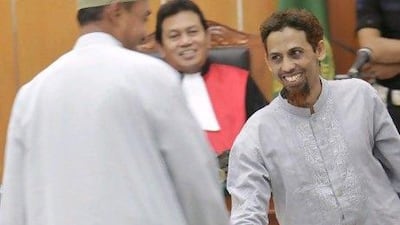JAKARTA // A convicted Indonesian terrorist said suspected Bali bomber Umar Patek also prepared the explosives used in a string of attacks on Jakarta churches in 2000, a court heard yesterday.
Eddy Setiono, who is serving a life sentence for terror offences, told a Jakarta court that he drove a car to several churches on Christmas Eve 2000 while Mr Patek "set up" bombs - disguised as gifts - in the back seat.
The bombs were delivered to churches and clergymen killing 19 people and injuring scores more.
Speaking at Mr Patek's trial over the church attacks and the 2002 Bali bombings, which killed more than 200 people, Setiono said the pair wanted to avenge the deaths of Muslims in Ambon and Poso in eastern Indonesia.
Sectarian violence claimed the lives of more than 6,000 Christians and Muslims between 1999 and 2002 in the two towns.
"We did that because of Ambon. Our conscience had spoken to us," Setiono said.
"For the Christmas bombing, I drove the car to several churches in Jakarta ... while Umar Patek set up the bombs in the back seat."
Mr Patek, 45, went on trial in February on charges including murder, bomb-making and possession of illegal firearms for the church attacks and Bali nightclubs blasts, which killed 202 people including 88 Australians.
Once the most-wanted terror suspect in Indonesia, who spent nearly a decade on the run, Mr Patek had a US$1 million (Dh3.67m) bounty placed on his head by the United States.
He was extradited to Indonesia after being arrested in January 2011 in Abbottabad, Pakistan the town where US commandos killed Osama bin Laden in May.
His trial is expected to last more than four months as prosecutors present evidence from 86 witnesses. Prosecutors say they will push for the death penalty.

